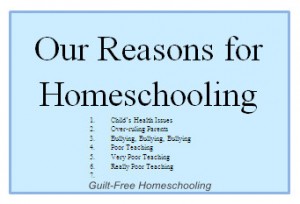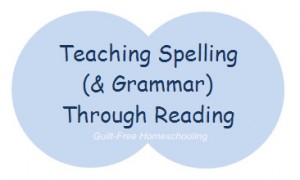It would be sadly futile to dedicate your valuable time to the academic side of homeschooling, only to the neglect of your children’s physical or spiritual health. While you are teaching reading and math, also teach the importance of getting proper rest (stressing to your future college-bound students the value of sleep during night-time hours) and a proper diet (again, of great importance to both the college-bound and anyone destined to be living independently someday).
Even young children can begin to recognize their body’s needs for sleep and nutritious food. Carefully explaining to a youngster that he has become grumpy because his body is tired from the hard work of play makes it easier for him to understand his need for rest or quiet playtime, and he will be less likely to view the quiet time as a punishment. Explaining in simple terms how our bodies need protein for fuel will help a youngster realize the value of eating a sandwich instead of begging for junk food. Urge the reluctant child to experiment with his own body — “You think carefully about how you feel all over now, and let’s see how you feel in another hour after eating some crackers with ham and cheese, and then tomorrow afternoon we’ll repeat the experiment with some candy.” (Science class and health class combined with personal experience!)
My daughter identifies her body signals very readily: she recognizes food cravings and quickly categorizes them as protein cravings, dehydration, etc. Her life-long struggle with migraine headaches is caused by monosodium glutamate (MSG) in food or health and beauty products. The “antidote” for MSG is magnesium, but since supplement tablets also contain MSG in the form of corn starch or gelatin, the magnesium needs to come from real foods. Recently my daughter noticed herself craving an odd assortment of foods; a little internet research revealed each of her cravings to be high in magnesium — broccoli, almonds, oatmeal, and the tastiest of all — dark chocolate. Having learned how to “read” her body’s signals helped her to realize what battle her body was fighting on its own.
A bedtime “routine” is helpful long after toddler-hood. I sleep much better if I have a chance to lie in bed and read, even if it is only for a few minutes before the lights go out. Soft lights and quieter volumes in the late evening subconsciously prepare your mind and body for sleep, quickly working their magic. A friend related her frustration at having to arrange alternate living quarters for her college-freshman son. The combination of his two roommates and their friends resulted in the dorm room lights staying on all the time — there was never a period of quiet or darkness. New room, new roommates, better health, happier parents.
God will faithfully guide you in applying His Word to everyday situations in your homeschool. The Bible is full of wonderful accounts of dynamic characters — both good and bad. Examples are readily available of people to be like and people not to be like. Both good and bad sibling relationships are found in the families of Joseph and David. Nathan learned the hard way to listen more closely to God: he spoke too quickly and had to retract his words. Samuel learned not to judge by appearances when God sent him to anoint the next king of Israel, David.
I kept my Bible handy throughout the day and looked up verses as we found them referenced in other books. I read the chapter of Proverbs that corresponded to the day of the month as an encouraging pick-me-up. We used an old family-hand-me-down book of Bible stories as a read-aloud book and enjoyed wonderful discussions prompted by the stories. I was pleasantly surprised at how often I could apply a Bible verse or an entire story to people or events in our own family. My own scripture knowledge improved, as well as building a wonderful foundation for my children.
See that your task of educating covers all facets of your children’s lives, ensuring that each student will grow into a well-rounded individual, able to handle his own needs in all areas of adult life. Teach the whole child, teaching good sleeping and eating habits, and feeding them spiritually.






 Guilt-Free Homeschooling is the creation of Carolyn Morrison and her daughter, Jennifer Leonhard. After serious disappointments with public school, Carolyn spent the next 11 years homeschooling her two children, from elementary to high school graduation and college admission. Refusing to force new homeschooling families to re-invent the wheel, Carolyn and Jennifer now share their encouragement, support, tips, and tricks, filling their blog with "all the answers we were looking for as a new-to-homeschooling family" and making this website a valuable resource for parents, not just a daily journal. Guilt-Free Homeschooling -- Equipping Parents for Homeschooling Success!
Guilt-Free Homeschooling is the creation of Carolyn Morrison and her daughter, Jennifer Leonhard. After serious disappointments with public school, Carolyn spent the next 11 years homeschooling her two children, from elementary to high school graduation and college admission. Refusing to force new homeschooling families to re-invent the wheel, Carolyn and Jennifer now share their encouragement, support, tips, and tricks, filling their blog with "all the answers we were looking for as a new-to-homeschooling family" and making this website a valuable resource for parents, not just a daily journal. Guilt-Free Homeschooling -- Equipping Parents for Homeschooling Success!

Recent Comments